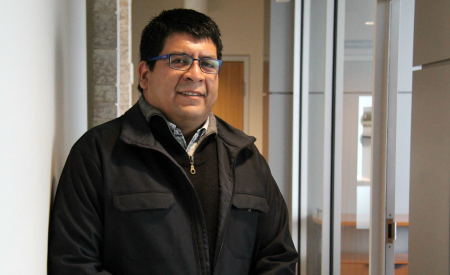
Juan Perez says a graduate degree is the perfect addition to engineering experience to advance your engineering career.
(Edmonton) International experience and post graduate education were the perfect combination for Juan Perez.
Perez graduates this spring with an Master's degree in Geo-Environmental Engineering and a great job he won in a national competition.
During his studies, he conducted research that had a positive impact at Peru's Antamina mine, one of the largest mining operations in the world.
His research focused on the assessment of a soil cover system for acid rock drainage (ARD) mitigation at the mine. "ARD is one of the most common problems in the mining industry and can have a significant impact in water quality," said Perez.
When minerals are exposed to the air and water, it creates acid-a problem that needs to be solved. At Antamina, the problem is huge.
"It requires closing and reclaiming approximately 1,600 tonnes of waste rock by the end of its operative life," said Perez.
This research brought together different stakeholders. The U of A Faculty of Engineering, Antamina, Teck, and the University of British Columbia collaborated to develop and implement strategies for the closure and reclamation of the different waste deposits.
"The objective of my research was to assess the performance of four soil cover systems. As part of the assessment I planned and conducted a field investigation to evaluate the properties of native soils used to build the different covers. To complement the field investigation, I also installed new instrumentation."
Throughout his masters, Perez travelled twice to Peru.
"I had support from the mine staff during all the time I stayed in Peru. They helped with the shipment of all my instruments and field-work equipment, they always gave me the resources I needed on the field to complete my tasks successfully and on time."
When he was in Peru doing the first assessment at the mine, he faced many challenges, but was confident that he was capable of solving them.
"One of the happiest days I've had was when I finished with the setup of the new monitoring station, and it started to work. I felt I had accomplished something big, but it was just the beginning."
For Perez, the combination of engineering experience he had before returning to school and the education he received during his graduate studies opened many opportunities.
He obtained his civil engineering degree at Pontificia Universidad Catolica del Peru and worked as a consultant for seven years before coming to the U of A. During that time he was involved as a civil-geotechnical engineer in mining projects in Peru, Chile, Panama, and Bolivia.
The idea of studying in Canada was sparked while working throughout Latin America. In that journey, he had the opportunity to work with Canadian engineers and was impressed by the training and experience they had.
After talking to his colleagues and friends about graduate school, he decided to pursue a Master's degree at a Canadian university because he wanted to advance in his career. At the U of A, his research was conducted under the supervision of Ward Wilson, a world-renowned expert in mine waste engineering.
Perez says taking on such project and earning an advanced degree is the only way mining engineers in Latin America can advance their careers.
"In Peru, post-graduate education is necessary to move forward in your career," he said.
So how did his graduate studies help him in Canada? It played a key role in landing Perez a job in a highly competitive market.
In January, he started working for Shell Canada in the Geotechnical and Tailings department at the Albian Sands project in Northern Alberta.